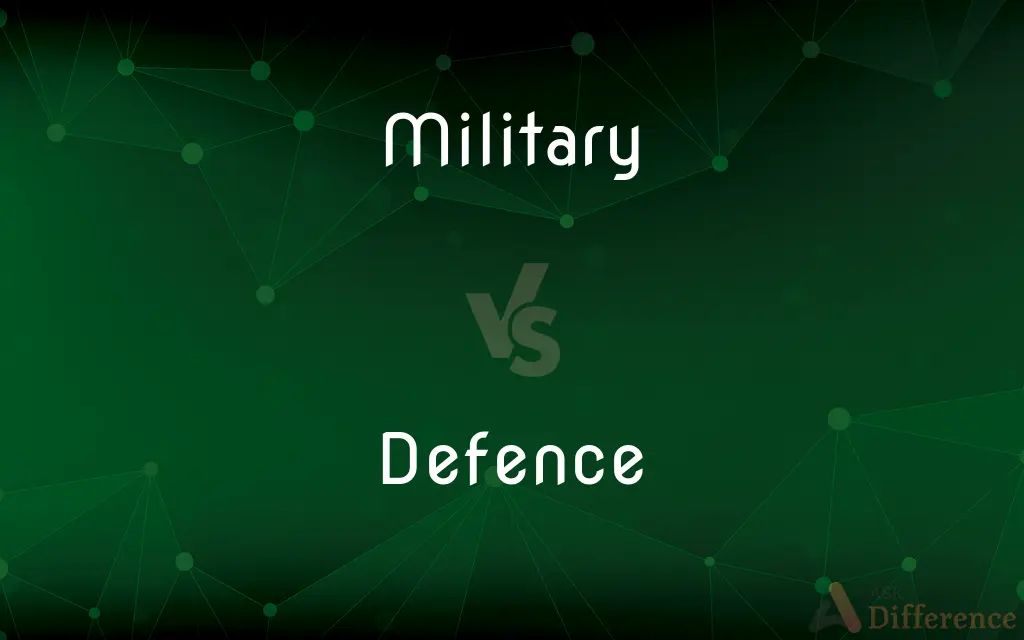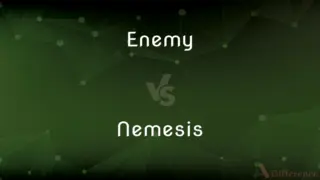Military vs. Defence — What's the Difference?
By Urooj Arif & Maham Liaqat — Updated on March 21, 2024
Military refers to the armed forces responsible for a nation's defense, emphasizing combat readiness, while defence signifies protective measures and strategies to safeguard against attacks.

Difference Between Military and Defence
Table of Contents
ADVERTISEMENT
Key Differences
The military encompasses the organized armed forces of a country, aimed at maintaining national security and sovereignty through readiness for combat and strategic operations. Defence, on the other hand, refers to a broader concept of protection and strategies designed to prevent or mitigate threats against a nation, encompassing both military actions and civilian measures.
Military forces are structured into branches such as the army, navy, and air force, each with specialized roles in defense operations and warfare. Defence strategies, whereas, include not only military deployment but also diplomatic, economic, and technological measures to ensure national security.
Training in the military is focused on preparing personnel for combat, mastering weapons, tactics, and survival skills. In contrast, defence readiness involves not just the military but also preparing civilian sectors for emergency responses, including disaster preparedness and homeland security measures.
The concept of military might is often associated with the offensive capabilities of a country, including the ability to project power beyond its borders. Defence, on the other hand, emphasizes a country's capability to protect itself from external and internal threats, highlighting a defensive posture.
Investment in the military involves funding for personnel, weapons systems, and infrastructure to maintain and enhance combat readiness. Investment in defence, on the other hand, might also include funding for intelligence services, cybersecurity measures, and alliances with other nations to strengthen collective security efforts.
ADVERTISEMENT
Comparison Chart
Focus
Organized armed forces and combat readiness
Broad strategies for safeguarding against threats
Structures
Branches like army, navy, air force
Military and civilian measures
Training
Combat, weapons, tactics
Includes military and emergency response for civilians
Concept
Offensive capabilities and power projection
Protective and defensive measures
Investment
Personnel, weapons systems, infrastructure
Includes intelligence, cybersecurity, alliances
Compare with Definitions
Military
Combat Training.
Soldiers undergo rigorous combat and tactical training.
Defence
Defensive Posture.
Defence focuses on safeguarding the nation from external and internal threats.
Military
Power Projection.
The military can deploy forces globally to protect national interests.
Defence
Emergency Preparedness.
Civil defense measures are in place for disaster response and recovery.
Military
Defense Readiness.
Military readiness is vital for national security and responding to threats.
Defence
Collective Security.
Investment in defence includes forming alliances for a stronger collective security network.
Military
Relating to or characteristic of soldiers or armed forces
He organized his shows with military precision
The build-up of military activity
Defence
Protective Measures.
Defence strategies include both military actions and civilian preparedness.
Military
The armed forces of a country
Most militaries remain subordinate to civilian authorities
As a young man he joined the military and pursued a career in the Army
Defence
The action of defending, of protecting from attack, danger or injury.
Military
Organizational Structure.
The military is organized into various branches and units based on specialization.
Defence
An organization of defenders that provides resistance against attack;
He joined the defense against invasion
Military
A military, also known collectively as armed forces, is a heavily armed, highly organized force primarily intended for warfare. It is typically officially authorized and maintained by a sovereign state, with its members identifiable by their distinct military uniform.
Defence
Comprehensive Security.
Defence encompasses economic, diplomatic, and technological measures.
Military
Of, relating to, or characteristic of members of the armed forces
A military bearing.
Military attire.
Defence
Variant of defense.
Military
Performed or supported by the armed forces
Military service.
Defence
Something used to oppose attacks.
Military
Of or relating to war
Military operations.
Defence
An argument in support or justification of something.
Military
Of or relating to land forces.
Defence
A strategy and tactics employed to prevent the other team from scoring; contrasted with offence.
Military
Armed forces
A country ruled by the military.
Defence
The portion of a team dedicated to preventing the other team from scoring; contrasted with offence.
Military
Members, especially officers, of an armed force.
Defence
Government policy or (infra)structure related to the military.
Department of Defence
Military
Characteristic of members of the armed forces.
She was dishonorably discharged from all military duties.
Defence
(obsolete) Prohibition; a prohibitory ordinance.
Military
(North America) Relating to armed forces such as the army, marines, navy and air force (often as distinguished from civilians or police forces).
If you join a military force, you may end up killing people.
Defence
To furnish with defences; to fortify.
Military
Relating to war.
Defence
See Defense.
Military
Relating to armies or ground forces.
Defence
(psychiatry) an unconscious process that tries to reduce the anxiety associated with instinctive desires
Military
Armed forces.
He spent six years in the military.
Defence
(sports) the team that is trying to prevent the other team from scoring;
His teams are always good on defense
Military
Of or pertaining to soldiers, to arms, or to war; belonging to, engaged in, or appropriate to, the affairs of war; as, a military parade; military discipline; military bravery; military conduct; military renown.
Nor do I, as an enemy to peace,Troop in the throngs of military men.
Defence
The defendant and his legal advisors collectively;
The defense called for a mistrial
Military
Performed or made by soldiers; as, a military election; a military expedition.
Defence
The speech act of answering an attack on your assertions;
His refutation of the charges was short and persuasive
In defense he said the other man started it
Military
The whole body of soldiers; soldiery; militia; troops; the army.
Defence
The justification for some act or belief;
He offered a persuasive defense of the theory
Military
The military forces of a nation;
Their military is the largest in the region
The military machine is the same one we faced in 1991 but now it is weaker
Defence
A structure used for defense;
The artillery battered down the defenses
Military
Of or relating to the study of the principles of warfare;
Military law
Defence
A defendant's answer or plea denying the truth of the charges against him;
He gave evidence for the defense
Military
Characteristic of or associated with soldiers or the military;
Military uniforms
Defence
Military action or resources protecting a country against potential enemies;
They died in the defense of Stalingrad
They were developed for the defense program
Military
Associated with or performed by armed services as contrasted with civilians;
Military police
Defence
Protection from harm;
Sanitation is the best defense against disease
Common Curiosities
What types of training do military personnel receive?
They receive combat, tactical, and weapons training, focused on preparing for warfare.
What is the primary difference between military and defence?
Military refers to the armed forces, while defence includes all measures to protect a nation.
How do military forces contribute to defence?
Military forces are a key component of a nation's defence strategy, prepared for combat and deterrence.
How is investment in the military different from investment in defence?
Military investment focuses on armed forces capabilities, whereas defence investment also covers broader security measures.
How do defence alliances enhance security?
Alliances provide collective security, sharing resources and intelligence for mutual protection.
Can defence strategies include offensive military actions?
While defence primarily focuses on protection, it can include offensive actions for deterrence or preemptive defense.
What role does diplomacy play in defence?
Diplomacy is crucial for preventing conflicts and forming alliances, integral to a comprehensive defence strategy.
How do internal and external threats influence defence strategies?
Defence strategies must adapt to address both types of threats, balancing resources and capabilities.
What are examples of non-military defence measures?
Non-military measures include cybersecurity, intelligence gathering, and diplomatic efforts.
Why is emergency preparedness part of defence?
It ensures the nation can respond effectively to non-military threats, such as natural disasters or public health emergencies.
What is the significance of cybersecurity in defence?
Cybersecurity protects against digital threats, crucial for national security in the modern world.
How does public perception affect military and defence policies?
Public support is crucial for funding and policy decisions, influencing the direction of military and defence efforts.
What is the impact of technology on military and defence?
Technology advances military capabilities and enhances defensive measures, including surveillance and communication.
What challenges do military and defence face today?
Challenges include adapting to new threats, technological changes, and ensuring interoperability among allies.
How does the concept of defence differ globally?
While the concept is universal, strategies and priorities vary based on regional threats and geopolitical considerations.
Share Your Discovery

Previous Comparison
Enemy vs. Nemesis
Next Comparison
Caipirinha vs. DaiquiriAuthor Spotlight
Written by
Urooj ArifUrooj is a skilled content writer at Ask Difference, known for her exceptional ability to simplify complex topics into engaging and informative content. With a passion for research and a flair for clear, concise writing, she consistently delivers articles that resonate with our diverse audience.
Co-written by
Maham Liaqat













































